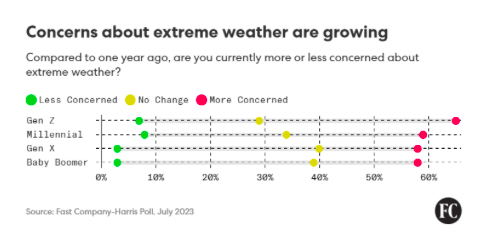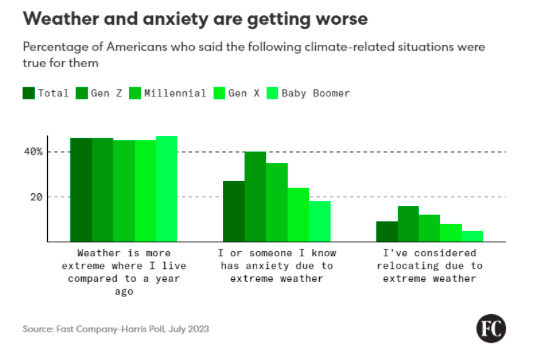Brief • 5 min Read
Grumpy Old Climate Deniers, Gen Z’s HR Requests, Bullish Hiring Report, and Back to School With Vaping Teens
As the fourth indictment news dominates the media, it will be difficult to escape the overarching political divide in the U.S. In our America, This Week survey, fielded August 11th to 13th, among 2,018 Americans, nearly three-quarters (74%, +2%-pts from September 2022) worry over political divisiveness in the U.S., something even most Republicans (68%) and Democrats (79%) can agree on.
This week, four new Harris Polls worth a skim: First, we cover Americans’ anxiety toward extreme weather events and climate change. We then dive into the workplace and identify the best benefits for Gen Z. Also, we’re projecting from new data that 2023 might finish with a hiring spree. And to end, back to school includes a surging use of vaping among teens in a recent study of the nation’s teachers and students.
You can download the new ATW monthly summary tabs and ppt deck here.
The Gen Z/Boomer Divide On Climate: Fast Company-Harris Poll
Recently we explored how climate change has woven itself into the American dreamscape. New Harris research with Fast Company details how extreme weather like the tragedy in Lahaina has nearly everyone unsettled––but divided on the root cause.
- Worry crosses all ages: Those with deep concerns about extreme weather spanned four generations – Gen Z (65%), Millennials (77%), Gen X (76%), and Boomers+ (75%) – with a majority of each group saying they are more concerned about extreme weather now than they were a year ago.

- But younger Americans connect extreme weather with climate change: Concerns are highest among Gen Z (82%), then Millennials (77%) and (72%) of Boomers+. But Gen Z is the most concerned in every category when the language “climate change” is used, while Boomers+ are the least concerned.
- And younger Americans (Gen Z: 40%, Millennials: 35%) said they or someone they know have experienced anxiety over extreme weather (v. Gen X: 24%, Boomers+: 18%).

Takeaway: From the hottest month in history to air-quality disruptions stemming from unprecedented expanses of fires, extreme weather is disrupting daily life and the American economy, and costing lives. That younger people cross their respective ideologies to connect severe weather to climate change is a hopeful sign for future consumer adoption of more clean energy practices built today from the $225m cleantech investments in Biden’s Inflation Reduction and Chips Act.
The Newest Company Must-Have Is Childcare: KinderCare-Harris Poll
New Harris research with KinderCare Learning Company, once a niche perk, child care benefits are now essential in employer’s efforts to attract and retain employees, especially Gen Z talent, who seem far more willing than older generations to switch jobs, move away, take a pay cut or even pause their career if it means finding affordable, quality child care.
- As Gen Z ages into parenthood, they see childcare as the most important benefit: More Gen Z parents (30%) rated childcare benefits slightly above health insurance (29%) when considering whether to stay or leave their current job, while (Millennials, Gen X, Baby Boomer) rated health insurance as most important.
- Willing to leave for childcare benefits: (43%) of Gen Z parents would switch jobs for financial assistance to cover childcare costs (v. Millennials: 33%, Gen X: 26%, Boomer+: 21%) and (52%) would switch jobs for on-site childcare.
- And the need for childcare is forcing big decisions: (36%) of Gen Z parents have accepted a job that pays less but has more flexibility (v. Millennial: 26%), and (29%) have moved to a new location to find childcare (v. Millennial: 19%).
Takeaway: “The quickly evolving world of work is affecting Gen Z in ways we’ve never seen before,” said Paul Thompson, President of KinderCare Learning Companies. “The shift to remote and hybrid models of work has been nothing short of seismic, and it’s affecting not only how, when, and where Gen Z is working but also in what they expect from employers for their work.”
2023’s Hiring Spree: Express Employment Services-Harris Poll
According to our new research with Express Employment Services in The Journal Record, despite continuing economic challenges and uncertainties, businesses across the country remain in hiring mode.
- Over 6 in 10 (62%) hiring managers surveyed have responded that their companies plan to hire additional workers before the end of 2023.
- For those that do, (52%) said additional employees are needed to manage higher volumes of work.
- Some (48%) said their companies have newly created positions to fill; (42%) cited needs to fill open positions left by employee turnover; and (28%) said they need more help after expanding into new markets.
- However, business managers reported some reluctance in taking on new hires: Around (20%) said they would likely wait to see how workloads shake out in coming months before making any hiring plans, and nearly a fifth (17%) said they’d put off hiring until after the economy returns “to normal.”
- For those anticipating smaller payrolls, (59%) cited a need to reduce costs as a cause, followed by a need to realign employee numbers to match declines in business (31%). Notably, almost a fifth (16%) of companies with expectations of reducing payrolls cited plans to increase their use of automation or technology.
Takeaway: Overall, hiring expectations have been trending upward over the past few years, Express Employment has said. “Despite challenging global economic conditions, it’s encouraging to see employers are confident enough in their financial situations to bring on additional staff,” Express Employment International CEO Bill Stoller said.
The Back to School Teen Vaping Crisis: Verkada-Harris Poll
As students head back to class this month, a Harris survey with Verkada reveals a rise in vaping among teens nationwide and its negative impacts, including lower academic performance, decreased student engagement, and heightened depression.
- Vaping’s popularity amongst teens is on the rise: Verkada’s Vape Activity Index shows a (20%) increase in vaping activity in the 2022-2023 academic year vs. the year prior, with more than eight in ten teachers (84%) and students (82%) surveyed saying there’s been an increase in teen vape usage over the past 24 months.
- This rise in vaping is having a direct impact on educators’ ability to teach and students’ academic performance: Among teachers who deal with classroom disruptions due to vaping, (87%) agree that vaping in school is disruptive to the learning environment, and around half report that vaping teens struggle to stay motivated (53%) and have trouble focusing (51%).
- Even teens know it’s a problem: Nearly all teens who vape (96%) view teen vaping to be a problem, with (61%) of vaping teens considering themselves to be addicted and (54%) wanting to quit vaping altogether.
- Vaping teens are sending alarming signals of depression: They are twice as likely than non-vaping teens to have felt depressed in the last month (71% vs. 35%) and are significantly less likely to feel optimistic about their physical health (42% vs. 67%).
Takeaway: “The post-pandemic resurgence of teen vaping has made the already difficult job of educating middle school and high school students even more challenging,” said Brandon Davito, Senior Vice President of Product and Operations at Verkada. “Teachers and school administrators have the best visibility into the impact of vaping on teens, and they are rightly concerned. The findings from this study reinforce what we are hearing from school staff across the country and issue an urgent warning for all parents, administrators, and teens to take action.”
Subscribe for more Insights
Subscribe to our newsletter for the latest trends in business, politics, culture, and more.
Download the Data
This survey was conducted online within the U.S. by The Harris Poll from August 11th to 13th among a nationally representative sample of 2,018 U.S. adults.
Download
Subscribe for more Insights
Subscribe to our newsletter for the latest trends in business, politics, culture, and more.
Download the Data
This survey was conducted online within the U.S. by The Harris Poll from August 11th to 13th among a nationally representative sample of 2,018 U.S. adults.
DownloadRelated Content







